七下Unit2 Neighbours Grammar课件
文档属性
| 名称 | 七下Unit2 Neighbours Grammar课件 | 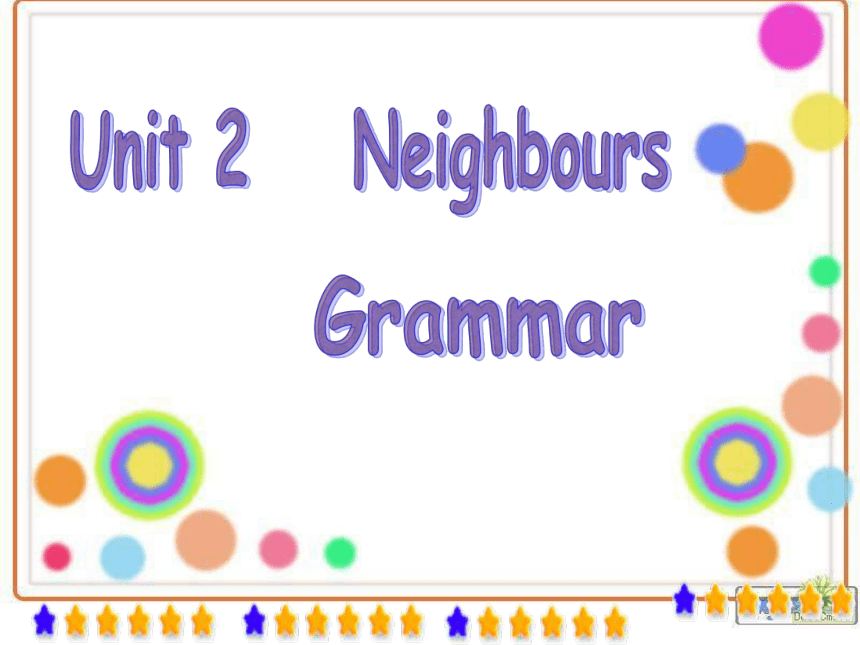 | |
| 格式 | zip | ||
| 文件大小 | 789.3KB | ||
| 资源类型 | 教案 | ||
| 版本资源 | 牛津译林版 | ||
| 科目 | 英语 | ||
| 更新时间 | 2016-03-30 22:19:46 | ||
图片预览




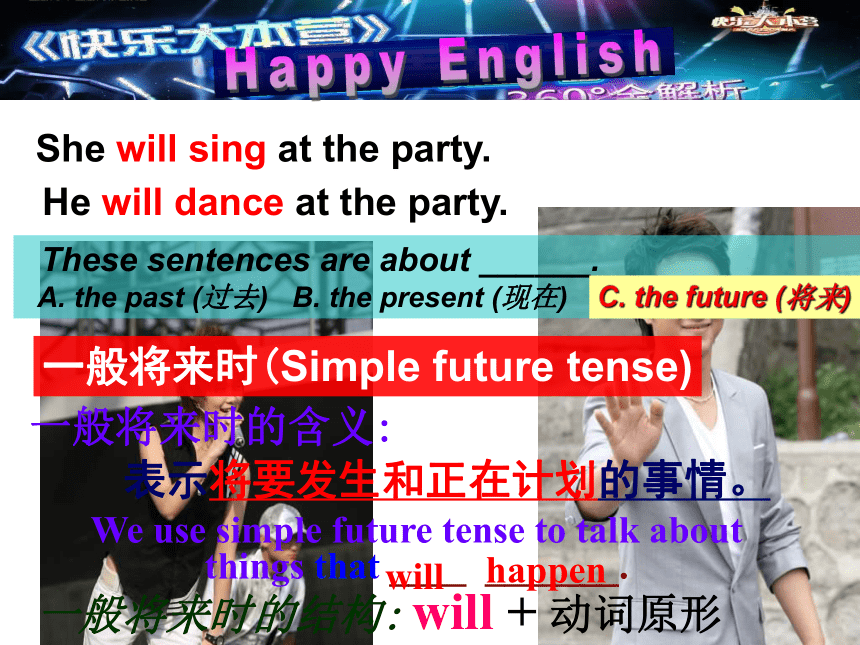
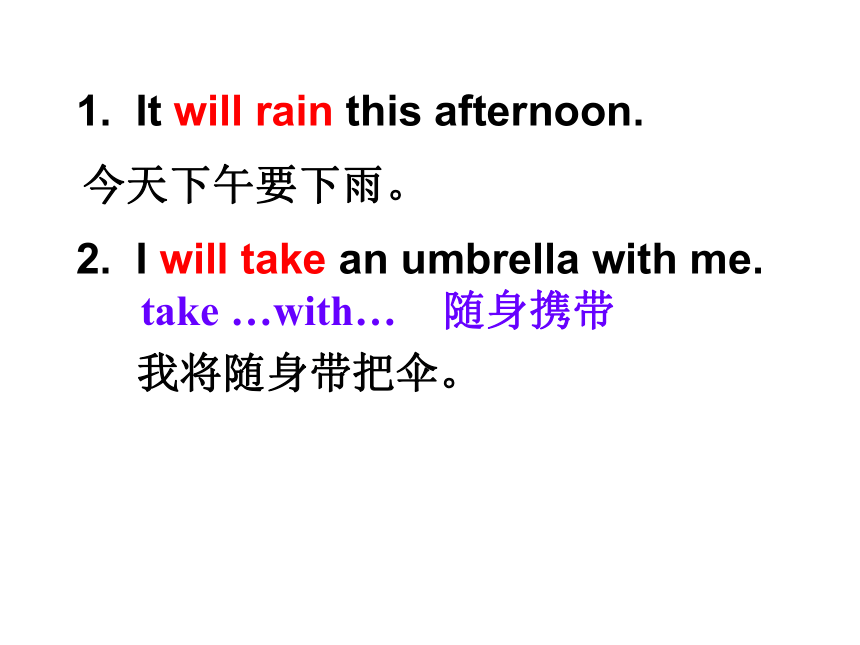
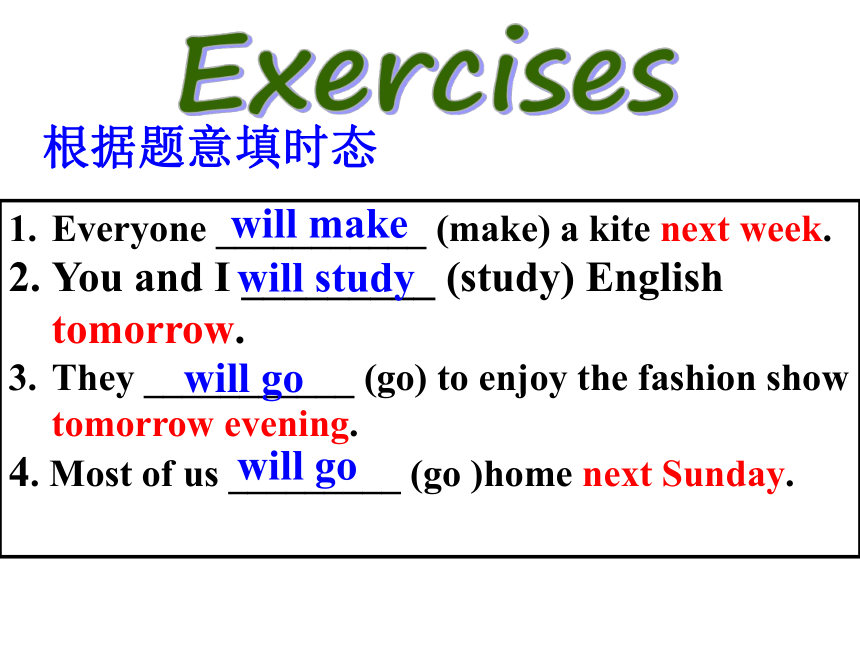
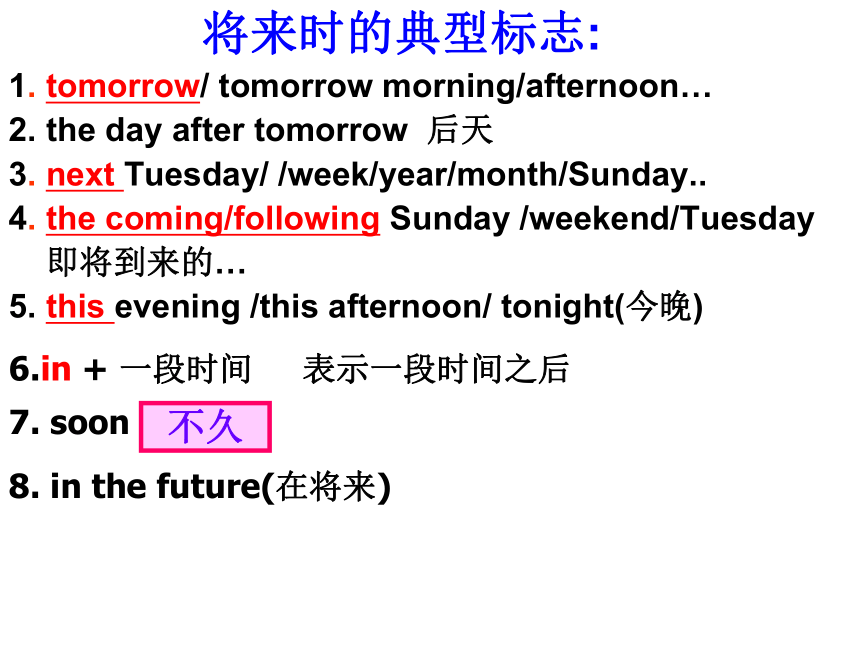
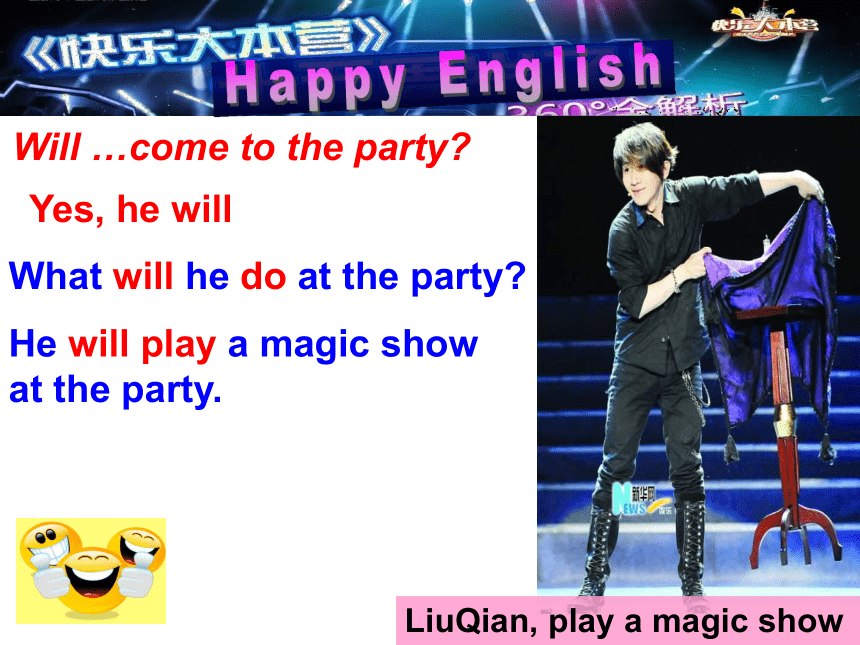
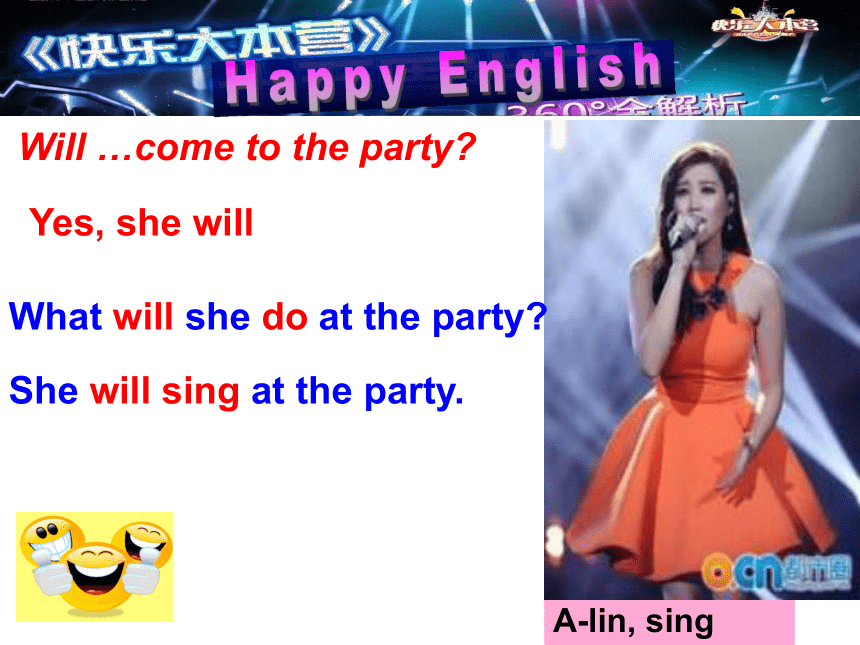

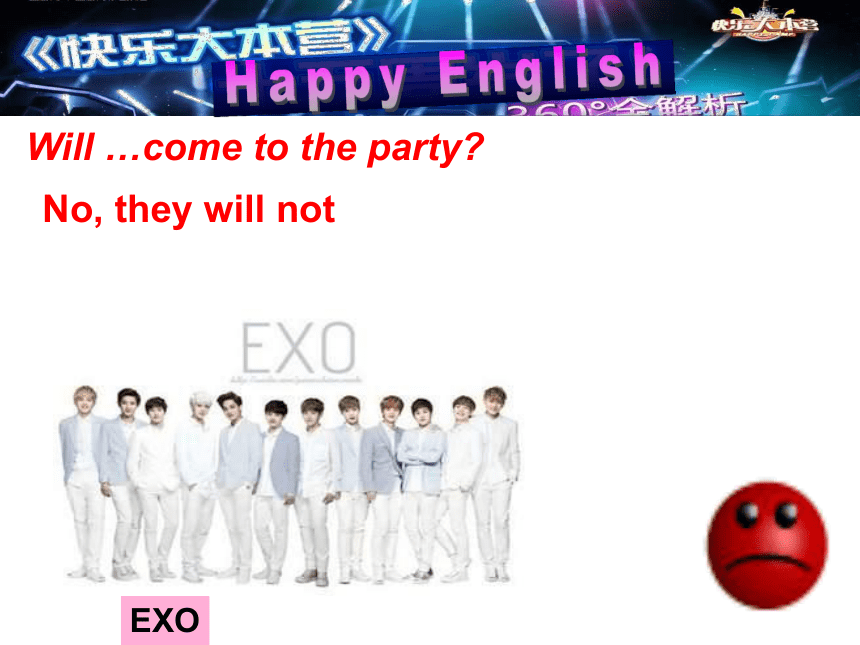
文档简介
课件35张PPT。Unit 2 NeighboursGrammar HAPPY CAMPHappy FamilyHappyEnglish Happy family will have a party called Happy English. They will
invite some stars to the party.next SaturdayNews:Do you want to know them? They will invite these stars to the party.They will perform(表演) at the party.Happy EnglishShe will sing at the party.He will dance at the party. These sentences are about ______.
A. the past (过去) B. the present (现在) C. the future (将来)一般将来时(Simple future tense)C. the future (将来)一般将来时的含义:表示将要发生和正在计划的事情。We use simple future tense to talk about things that ____ _______.willhappen一般将来时的结构:will + 动词原形1. It will rain this afternoon.2. I will take an umbrella with me.
take …with… 随身携带今天下午要下雨。我将随身带把伞。Everyone ___________ (make) a kite next week.
You and I _________ (study) English tomorrow.
They ___________ (go) to enjoy the fashion show tomorrow evening.
4. Most of us _________ (go )home next Sunday.
will make will studywill gowill go根据题意填时态Exercises1. tomorrow/ tomorrow morning/afternoon…
2. the day after tomorrow 后天
3. next Tuesday/ /week/year/month/Sunday..
4. the coming/following Sunday /weekend/Tuesday
即将到来的…
5. this evening /this afternoon/ tonight(今晚)7. soon不久将来时的典型标志:6.in + 一段时间 表示一段时间之后8. in the future(在将来) Happy EnglishHe will play a magic show at the party.Will …come to the party?Yes, he willLiuQian, play a magic showWhat will he do at the party?Happy EnglishShe will sing at the party.A-lin, singWill …come to the party?Yes, she willWhat will she do at the party?Happy EnglishHe will dance at the party.Will …come to the party?BigBang, danceYes, he willWhat will he do at the party?Happy EnglishWill …come to the party?EXONo, they will notLiuQian, play a magic showA-lin, singBigBang, danceHe/She will……Will …come to the party?What will he/she do?Yes, he/she will.What will you do if you go to the party?I will sing a song.shallI 在将来时中当主语是 I / We时,可以用shall 代替will,否定句为shall not/shan’t +V.原形;一般疑问句将shall放在句首否定句:I shall not/ shan’t sing a song.一般疑问句:Shall I sing a song?I will not/ won’t sing a song.Will I sing a song?I / WeI / We
You /You
He / She /It
They
….. shall + V.will + V.一般将来时的结构:(structure)一般将来时各种句式:1.肯定句:主语+ will/shall +v.原形2.否定句:主语+ will/shall +not+v.原形won’t/shan’t+v.原形3.一般疑问句:will/shall置于句首(will/shall+主语+v.原形…? ﹚4.一般疑问句回答:肯定:Yes, 人称代词+will/shall.否定:No, 人称代词+won’t/shan’t.句型转换:
Amy will do her homework tonight.
(否定句)
(一般疑问句)
(肯定回答)
(否定回答) Amy will not/won’t do her homework tonight. Let's practiseWill Amy do her homework tonight?Yes, she will.No, she won’t.句型转换:
2. The boy will visit Tom next year.
(否定句)
(一般疑问句)
(否定回答)
3.The boy will play football tomorrow.
(对划线提问)
The boy will not/won’t visit Tom next year.Let's practiseWill the boy visit Tom next year?No, it will not/won’t.What will the boy do? Simon’s computer is broken. He is asking
someone at the community centre for help.
Complete their conversation with the simple
future tense of the verbs in brackets.Asking for help ask for help 求助
ask sb. for help 向某人求助Mr Lin: Hello, Simon. Do you need any help?
Simon: Yes, Mr Lin. There’s something wrong with my computer.
Mr Lin: OK. We (1) ____________ (ask) an engineer to check it for you.
Simon: When (2) ___ the engineer ___ (be) free?
Mr Lin: Well, we (3) ___________ (call) him first. (4) ____ you ____ (wait) for us to call back?
Simon: All right. I (5) ____________ (wait) for your call. Thanks.
Mr Lin: You are welcome.
will askwillbewill callWillwaitwill wait/shall/shall/shallThe weekend is coming.What are you going to do this weekend?They are going to play football.They are going to fly kites.play football.
fly kitesWhat are they going to do tomorrow?He is going to skate.skateWhat is he going to do tomorrow?be going to:用来表示按计划要发生的动作,
也可以表示推测将来可能会发生的动作。be going to + V.原形由主语决定amareisareare 2.看那些乌云要下雨了.
Loot at the dark clouds. It __________rain.is going to表示推测将来可能发生的事。1.我打算去拜访我的新邻居。
I____________ visit our new neighbours.am going to(计划)be going to各种句式:肯定句:
否定句:
一般疑问句:主语+be going to+V.原形主语+ be+not+going to+V.原形将be置于句首Be+主语+going to+V.原形…?1. We are going to have an exam next week.(改为否定句)
2. Tom is going to see a film this evening.
(改为一般疑问句,并作肯否定回答)
We aren’t going to have an exam next week. Is Tom going to see a film this eveningYes, he isNo, he is notLet's practiseSimon is telling Amy about his plan for a day out with his uncle’s family. Help him use the correct forms of be going to to talk about his plan.Planning a day outSimon: Hi, Amy. My parents and I are planning a day out with my uncle’s family the day after tomorrow.
Amy: Great! What (1)___ you _________ (do)?
Simon: I (2) ______________ (buy) some food, and my cousin Annie (3) _____________ (buy) some plates and forks.
Amy: What (4) ___ your parents __________ (do)?
Simon: They (5) ________________ (bring) some water.
Amy: How about your uncle?
Simon: He (6) ______________ (make) a fire.
Amy: And your aunt? What (7) ____ she _________ (do)?
Simon: She (8) ______________ (cook) some food.aregoing to doam going to buyis going to buyaregoing to doare going to bringis going to makeisgoing to dois going to cookLanguage points:1. 计划外出的一天
plan a day out
plan v. (planning)
2. 后天 the day after tomorrow
3. bring 带来
take 带走
Remember to _______your homework here.
Can you ______ my computer to my office.
4. 生火 make a fire
Exercises1.They ___the Great Wall tomorrow morning.
A. shall visit B. are visit C. will visit2.Look at those big black clouds. It __ rain. Let’s hurry.
A. must B. will C. would D. is going to3. My sister wants a new dress. She _____ it to the party.
A. wears? B. has worn
C. wore D. is going to wear注意1. be going to和will在一般将来时态中一般可以互用,不影响句子的意思。
I am going to carry water.
He is going to make a fire.
They are going to cook.
will/shallwillwillbe going to 和 will 也有区别:
当表示对将来发生某事的客观描述时,一般用will.
当表示通过主观推测/猜测,将来可能发生的事,一般
用be going to: The radio says, it ______________ rain tomorrow.
Loot at the dark clouds. It __________ rain tomorrow.is going tois going to2、 there be 的一般将来时There will be…
There is/are going to be…
There will be a new supermarket around my home next year.
There are going to be two football matches between the teams this afternoon.
一般将来时的结构:(structure)will + 动词原形shall + 动词原形用于主语为第一人称
(I/we)时
用于一切
人称be going to + V.原形Summary(总结) 1.2.HomeworkWrite an article on your plan for
a day out.
2. Prepare for Integrated Skills.
invite some stars to the party.next SaturdayNews:Do you want to know them? They will invite these stars to the party.They will perform(表演) at the party.Happy EnglishShe will sing at the party.He will dance at the party. These sentences are about ______.
A. the past (过去) B. the present (现在) C. the future (将来)一般将来时(Simple future tense)C. the future (将来)一般将来时的含义:表示将要发生和正在计划的事情。We use simple future tense to talk about things that ____ _______.willhappen一般将来时的结构:will + 动词原形1. It will rain this afternoon.2. I will take an umbrella with me.
take …with… 随身携带今天下午要下雨。我将随身带把伞。Everyone ___________ (make) a kite next week.
You and I _________ (study) English tomorrow.
They ___________ (go) to enjoy the fashion show tomorrow evening.
4. Most of us _________ (go )home next Sunday.
will make will studywill gowill go根据题意填时态Exercises1. tomorrow/ tomorrow morning/afternoon…
2. the day after tomorrow 后天
3. next Tuesday/ /week/year/month/Sunday..
4. the coming/following Sunday /weekend/Tuesday
即将到来的…
5. this evening /this afternoon/ tonight(今晚)7. soon不久将来时的典型标志:6.in + 一段时间 表示一段时间之后8. in the future(在将来) Happy EnglishHe will play a magic show at the party.Will …come to the party?Yes, he willLiuQian, play a magic showWhat will he do at the party?Happy EnglishShe will sing at the party.A-lin, singWill …come to the party?Yes, she willWhat will she do at the party?Happy EnglishHe will dance at the party.Will …come to the party?BigBang, danceYes, he willWhat will he do at the party?Happy EnglishWill …come to the party?EXONo, they will notLiuQian, play a magic showA-lin, singBigBang, danceHe/She will……Will …come to the party?What will he/she do?Yes, he/she will.What will you do if you go to the party?I will sing a song.shallI 在将来时中当主语是 I / We时,可以用shall 代替will,否定句为shall not/shan’t +V.原形;一般疑问句将shall放在句首否定句:I shall not/ shan’t sing a song.一般疑问句:Shall I sing a song?I will not/ won’t sing a song.Will I sing a song?I / WeI / We
You /You
He / She /It
They
….. shall + V.will + V.一般将来时的结构:(structure)一般将来时各种句式:1.肯定句:主语+ will/shall +v.原形2.否定句:主语+ will/shall +not+v.原形won’t/shan’t+v.原形3.一般疑问句:will/shall置于句首(will/shall+主语+v.原形…? ﹚4.一般疑问句回答:肯定:Yes, 人称代词+will/shall.否定:No, 人称代词+won’t/shan’t.句型转换:
Amy will do her homework tonight.
(否定句)
(一般疑问句)
(肯定回答)
(否定回答) Amy will not/won’t do her homework tonight. Let's practiseWill Amy do her homework tonight?Yes, she will.No, she won’t.句型转换:
2. The boy will visit Tom next year.
(否定句)
(一般疑问句)
(否定回答)
3.The boy will play football tomorrow.
(对划线提问)
The boy will not/won’t visit Tom next year.Let's practiseWill the boy visit Tom next year?No, it will not/won’t.What will the boy do? Simon’s computer is broken. He is asking
someone at the community centre for help.
Complete their conversation with the simple
future tense of the verbs in brackets.Asking for help ask for help 求助
ask sb. for help 向某人求助Mr Lin: Hello, Simon. Do you need any help?
Simon: Yes, Mr Lin. There’s something wrong with my computer.
Mr Lin: OK. We (1) ____________ (ask) an engineer to check it for you.
Simon: When (2) ___ the engineer ___ (be) free?
Mr Lin: Well, we (3) ___________ (call) him first. (4) ____ you ____ (wait) for us to call back?
Simon: All right. I (5) ____________ (wait) for your call. Thanks.
Mr Lin: You are welcome.
will askwillbewill callWillwaitwill wait/shall/shall/shallThe weekend is coming.What are you going to do this weekend?They are going to play football.They are going to fly kites.play football.
fly kitesWhat are they going to do tomorrow?He is going to skate.skateWhat is he going to do tomorrow?be going to:用来表示按计划要发生的动作,
也可以表示推测将来可能会发生的动作。be going to + V.原形由主语决定amareisareare 2.看那些乌云要下雨了.
Loot at the dark clouds. It __________rain.is going to表示推测将来可能发生的事。1.我打算去拜访我的新邻居。
I____________ visit our new neighbours.am going to(计划)be going to各种句式:肯定句:
否定句:
一般疑问句:主语+be going to+V.原形主语+ be+not+going to+V.原形将be置于句首Be+主语+going to+V.原形…?1. We are going to have an exam next week.(改为否定句)
2. Tom is going to see a film this evening.
(改为一般疑问句,并作肯否定回答)
We aren’t going to have an exam next week. Is Tom going to see a film this eveningYes, he isNo, he is notLet's practiseSimon is telling Amy about his plan for a day out with his uncle’s family. Help him use the correct forms of be going to to talk about his plan.Planning a day outSimon: Hi, Amy. My parents and I are planning a day out with my uncle’s family the day after tomorrow.
Amy: Great! What (1)___ you _________ (do)?
Simon: I (2) ______________ (buy) some food, and my cousin Annie (3) _____________ (buy) some plates and forks.
Amy: What (4) ___ your parents __________ (do)?
Simon: They (5) ________________ (bring) some water.
Amy: How about your uncle?
Simon: He (6) ______________ (make) a fire.
Amy: And your aunt? What (7) ____ she _________ (do)?
Simon: She (8) ______________ (cook) some food.aregoing to doam going to buyis going to buyaregoing to doare going to bringis going to makeisgoing to dois going to cookLanguage points:1. 计划外出的一天
plan a day out
plan v. (planning)
2. 后天 the day after tomorrow
3. bring 带来
take 带走
Remember to _______your homework here.
Can you ______ my computer to my office.
4. 生火 make a fire
Exercises1.They ___the Great Wall tomorrow morning.
A. shall visit B. are visit C. will visit2.Look at those big black clouds. It __ rain. Let’s hurry.
A. must B. will C. would D. is going to3. My sister wants a new dress. She _____ it to the party.
A. wears? B. has worn
C. wore D. is going to wear注意1. be going to和will在一般将来时态中一般可以互用,不影响句子的意思。
I am going to carry water.
He is going to make a fire.
They are going to cook.
will/shallwillwillbe going to 和 will 也有区别:
当表示对将来发生某事的客观描述时,一般用will.
当表示通过主观推测/猜测,将来可能发生的事,一般
用be going to: The radio says, it ______________ rain tomorrow.
Loot at the dark clouds. It __________ rain tomorrow.is going tois going to2、 there be 的一般将来时There will be…
There is/are going to be…
There will be a new supermarket around my home next year.
There are going to be two football matches between the teams this afternoon.
一般将来时的结构:(structure)will + 动词原形shall + 动词原形用于主语为第一人称
(I/we)时
用于一切
人称be going to + V.原形Summary(总结) 1.2.HomeworkWrite an article on your plan for
a day out.
2. Prepare for Integrated Skills.
